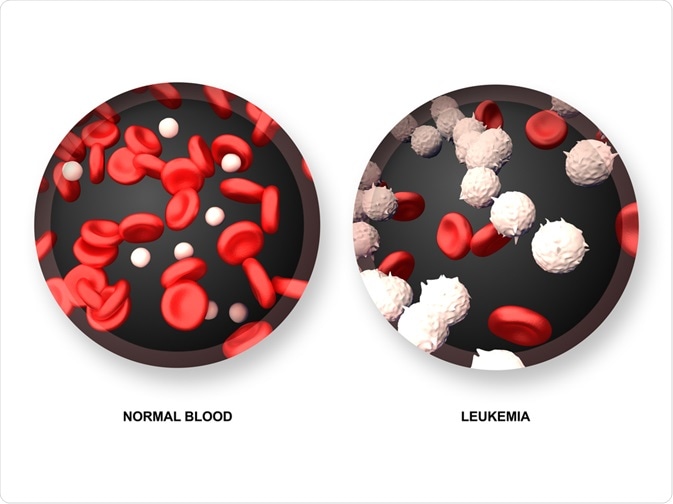CLL has many signs and symptoms, therefore it is not uncommon for CLL to be discovered incidentally. Up to half of those affected may have no symptoms at the time of diagnosis or may be diagnosed whilst under investigation for another condition.

decade3d - anatomy online | Shutterstock
Chronic lymphocytic leukemia (CLL), also known as chronic lymphoid leukemia, is an oncological condition that is distinguished by the progressive accretion of non-functioning lymphocytes. It is the most common type of leukemia in the adult population of Western countries.
What are the most common signs symptoms of CLL?
The most common sign of CLL, which is seen in almost 90% of cases, is the enlargement of lymph nodes. The enlarged lymph nodes may be commonly found in the neck, armpits or groin, and they are usually not painful. In addition to the enlarged lymph nodes, the patient may also have an enlarged spleen, which may expand to the point of causing discomfort and/ or pain in the vicinity of its anatomical location in the left upper quadrant (LUQ) of the abdomen. This splenic enlargement may also cause those affected to experience early satiety.
At the time of diagnosis, patients may or may not present with classical “B symptoms” that usually suggest the presence of an active malignancy in the body. These symptoms, which signal alarm bells to any clinician, are unexplained weight loss, intractable fatigue, high fevers, and night sweats.
Malignancy-associated weight loss is typically more than 10% of the patient’s body weight in the past 6 months. The fatigue must be severe enough to interfere with the patient’s ability to work and/or perform daily activities, while fevers should be more than 38°C (100.5°F) for a period of at least 14 days in the absence of infection. Furthermore, night sweats are characteristically drenching, requiring a change of clothing and bed sheets, since these are usually soaked.
As a result of the immune system dysfunction that arises due to qualitative and quantitative immune-effector-cell defects, CLL may predispose patients to recurrent infections. These patients have abnormal humoral and cellular-mediated immune responses, which may stem from the condition itself or as a consequence of the therapy used to treat it.
Infections in CLL commonly affect the respiratory tract, but patients can also contract other conditions, such as herpes simplex and herpes zoster.
What are the symptoms and signs of advanced chronic lymphocytic leukemia?
As CLL progresses, healthy blood-making cells of the bone marrow are continuously replaced by the functionally incompetent leukemic cells. This results in a series of complications, namely, anemia, leukopenia and thrombocytopenia, which are shortages of red blood cells (RBCs), white blood cells (WBCs) and platelets, respectively. These three conditions in turn cause a wide range of signs and symptoms of their own. Anemic patients complain of tiredness, dizziness, fatigue, shortness of breath and generalized weakness, due to a low RBC count.
While CLL-affected patients may have excess numbers of lymphocytes, known as lymphocytosis, their functional WBCs are actually very low. As a result, these patients are predisposed to infections by microorganisms, such as bacteria, viruses and fungi.
A shortage of platelets gives rise to the complication of mucocutaneous bleeding, as well as petechiae. These patients tend to present with frequent nosebleeds, in addition to easy bruising, and bleeding from the gums.
Chronic Lymphocytic Leukemia (CLL) - Mayo Clinic
Further Reading
Last Updated: Dec 29, 2022